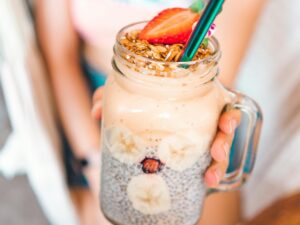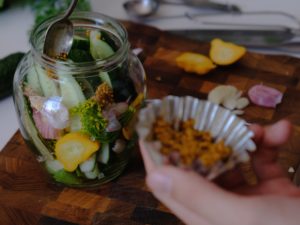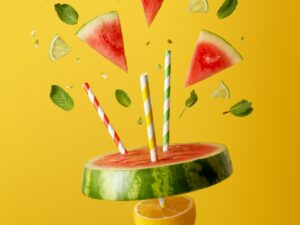Sucralose, the Most Popular Artificial Sweetener in the USA, is Probably Making You Sick
High amounts of sugar in your diet have detrimental effects on health, therefore more people are turning to sugar substitutes. Sucralose is the most popular sugar alternative in the US, used as a sweetener in hundreds of products.

But this sweet treat might come at a high cost as scientists find more and more health risks associated with its consumption.
Accumulating research may indicate that there are healthier alternatives to sucralose available.
Find out everything you need to know, all the science-supported information, about sucralose today.
The answers to questions like “what is sucralose?”, “what food products contain sucralose?”, “is sucralose dangerous?”, “what are the health risks with sucralose?”, “what can I use instead of sucralose?”, and many more.
What is Sucralose?
Sucralose is a non-nutritive sweetener used in a variety of products, the most common being Splenda.
This sweetener by itself is not absorbed by the body. It is derived from a chemical process and is about 600 times sweeter than regular sugar.
And like many inventions, it was discovered by accident.
At Queen Elizabeth College, an assistant was told to test a substance, and he understood taste.
Nutrition Information on Sucralose
While sucralose itself does not contain calories, Splenda contains dextrose (sugar) and maltodextrin, which bring the calories to about 3.4 per serving.
Splenda has:
Net Carbs: 0.9g
Fat: 0g
Protein: 0g
How was Sucralose Approved by the FDA?
The Food and Drug Administration (FDA), after a decade of regulation, ended up approving sucralose for consumption in 1999 as a sweetener.
It was the fastest instance of approval for an artificial sweetener to date. While about 100 studies were evaluated, many of the studies were not published, none of the studies involved humans, and only 3 studies lasted more than a year.
Since then, many new studies have been conducted with humans, but the FDA has not reevaluated any statements.
These newer studies found risks to human health, including metabolism changes, weight issues, and even cancer.
What Foods and Drinks Contain Sucralose?
Common foods that contain sucralose are Splenda, diet sodas, chewing gum, salad dressings, condiments, and syrups.
A variety of “sugar-free” products contain sucralose, many sauces, jams, soups, and more may contain it as well.
Some canned fruits may also be artificially sweetened with sucralose, and it may appear in some “low carb” bread, protein powders, collagen powders, and more.
What are the Risks of Sucralose?
Here are all the science-based hazards of consuming this sweetener.
Unstable When Heated
Sucralose was said to be the perfect sugar alternative in baking, as it’s “made from sugar, so it tastes like sugar.” Recent studies have challenged its stability though.
One study found that this sweetener breaks down at high temperatures, interacting with other ingredients. Another study found that when combined with glycerol (a compound in fat) at high temperatures, it produces chloropropanols, a cancer risk.
This isn’t even at extremely high temperatures. These negative effects can occur at 250°F or higher.
Absorption and Bioaccumulation
Sucralose was said to have little absorption, therefore it did not accumulate in the body, but recent studies have indicated otherwise.
A study of women found that sucralose appeared even in breast milk two hours after consumption, indicating that more of this sugar substitute is absorbed than previously thought. This also means infants are exposed to questionable substances.
An animal study found that while the sweetener was no longer in the urine, it was detected in the body tissue. While human studies should be conducted, this raises concerns.
Insulin Resistance
A study done with humans found that sucralose elevated blood sugar significantly.
This can lead to further insulin resistance, the condition in which more insulin is needed to regulate blood sugar. A condition that is a precursor to type 2 diabetes.
Other studies found that there was little blood sugar elevation, but these were conducted on people who regularly consumed the sweetener.
Decreased Gut Microbiome Health
Animal studies have since found that this sweetener can harm the gut, leading to inflammation.
Furthermore, an animal study found that consumption of sucralose by pregnant organisms leads to inflammation and gut microbiota imbalances that affect the function of the offspring’s gut health.
This increases the risk of digestive issues such as irritable bowel syndrome and can decrease the good gut bacteria needed for good health.
Studies found that it also decreased good gut bacteria while not affecting bad gut bacteria, and the effects lasted long after the conclusion of the study.
The microbiome is essential as it houses much of our immune system defense, helps us absorb and process nutrients, and even produces serotonin and other chemicals to regulate and improve mood.
Weight Gain
Many studies have found that sucralose does not help weight management.
Continuous consumption of this sugar alternative alters the gut microbiota in a way that may cause glucose intolerance.
Eating sucralose also alters the body’s response to glucose, meaning that the nonnutritive sweetener alters the regular response to glucose. Other studies have found that it triggers hunger, meaning you will still consume more calories.
Cancer
As stated before, studies have found that sucralose interactions with other compounds to form cancer-causing substances at high temperatures.
Another study suggests that inflammation caused by this sugar substitute damages liver cells and increases tumor markers in the colon.
What Sweetener to Use Instead?
If you don’t mind sugar, can tolerate it well, and have no underlying conditions such as diabetes, using sugar might be preferable. Something like honey or coconut sugar may be a bit better than white sugar.
If you want to try natural sweetness, use dates, or other fruits, to sweeten things. Safer sugar substitutes include stevia and monk fruit, as these can be safely used.
Here is a full list of what sugar substitutes are safe and which to avoid!
The Takeaway
Sucralose is in many products, including many labeled as healthy and sugar-free.
This is one sugar substitute that may not be all that great for health, and there are safer alternatives to choose from. If animal studies were used to approve sucralose, animal studies can be used to un-approve it.
While human studies are necessary, there are enough reasons to suspect hazards and at least limit the consumption of sucralose. Do not use it to bake or cook, as high temperatures can lead to cancer-causing components forming.
Human studies conducted also indicate that this sweetener may be harmful to us.
When in doubt, do without! Health starts from within, so little changes to what we consume can have a huge impact on our wellness and overall well-being!





